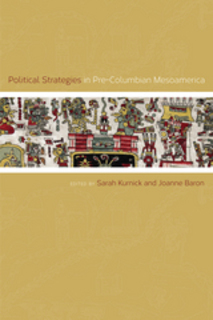Political Strategies in Pre-Columbian Mesoamerica
"[A]n interesting volume with spatial breadth and temporal depth. There are central themes— contradictions inherent in social inequality, and how they can be and were negotiated— but there is no suppression of disagreement and discussion. . . . I found this collection to be stimulating and believe others will find it so as well."
—Journal of Anthropological Research
“This volume stands out both for its insistence on theoretical acuity and for its fluid discussion of archaeological data. It will attract audiences beyond the Mesoamerican and archaeological realms, such as scholars and students of the political history of ancient American societies, ethnohistory, art history, and cultural anthropology.”
—Hispanic American Historical Review
Political authority contains an inherent contradiction. Rulers must reinforce social inequality and bolster their own unique position at the top of the sociopolitical hierarchy, yet simultaneously emphasize social similarities and the commonalities shared by all. Political Strategies in Pre-Columbian Mesoamerica explores the different and complex ways that those who exercised authority in the region confronted this contradiction.
New data from a variety of well-known scholars in Mesoamerican archaeology reveal the creation, perpetuation, and contestation of politically authoritative relationships between rulers and subjects and between nobles and commoners. The contributions span the geographic breadth and temporal extent of pre-Columbian Mesoamerica—from Preclassic Oaxaca to the Classic Petén region of Guatemala to the Postclassic Michoacán—and the contributors weave together archaeological, epigraphic, and ethnohistoric data.
Grappling with the questions of how those exercising authority convince others to follow and why individuals often choose to recognize and comply with authority, Political Strategies in Pre-Columbian Mesoamerica discusses why the study of political authority is both timely and significant, reviews how scholars have historically understood the operation of political authority, and proposes a new analytical framework to understand how rulers rule.
Contributors: Sarah B. Barber, Joanne Baron, Christopher S. Beekman, Jeffrey Brzezinski, Bryce Davenport, Charles Golden, Takeshi Inomata, Arthur A. Joyce, Sarah Kurnick, Carlo J. Lucido, Simon Martin, Tatsuya Murakami, Helen Perlstein Pollard, Víctor Salazar Chávez
Texts
Uncategorized
Political Strategies in Pre-Columbian Mesoamerica
by Sarah Kurnick- 0This text has 0 annotations
- 12This text has 12 highlights
Metadata
- publisherUniversity Press of Colorado
- publisher placeDenver, Colorado
- rights
- rights holderUniversity Press of Colorado


